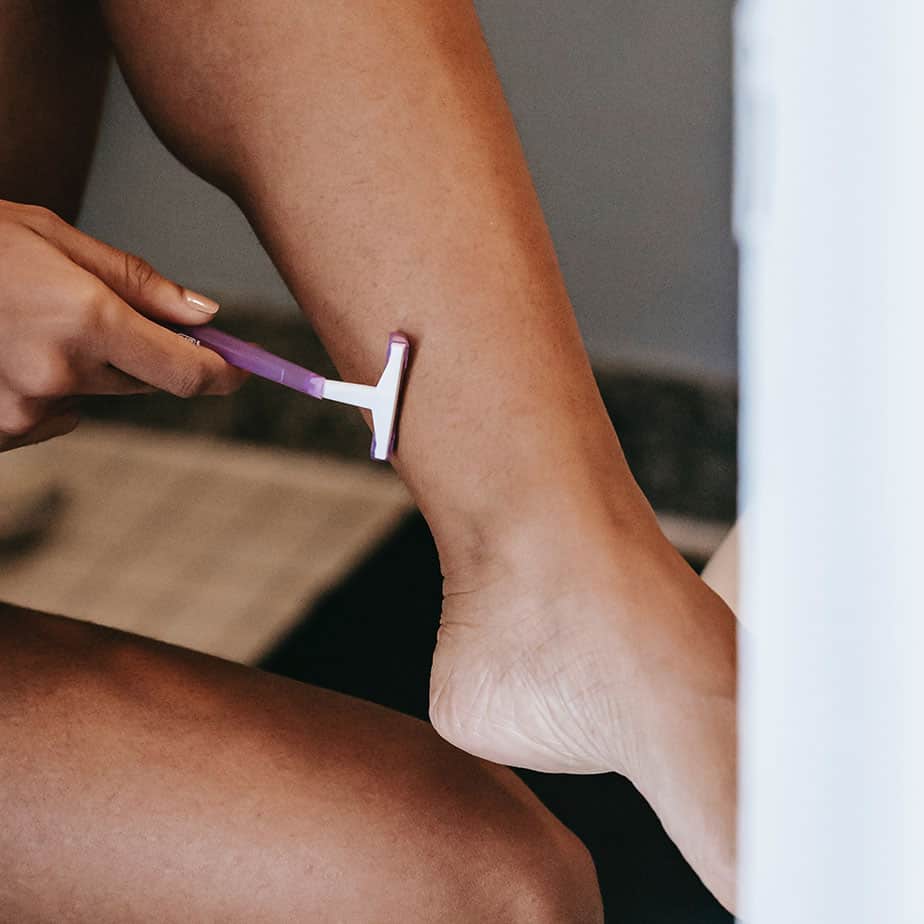Do you have an abundance of leg hair, chest hair, or overall body hair that you’re thinking about shaving off to improve your surfing performance? Athletes from other sports such as swimming, running, and climbing do it and report advantages from the reduced friction their hairless skin provides, so does the same thing apply to surfing?
Many surfers choose to shave their hair because they feel that it provides a variety of benefits, such as reduced friction, cooler body temperature, decreased likelihood of getting a wetsuit/surf rash or hair pulled out by the wetsuit/surfboard, and the nice sensation of gliding through the water. Others have said that shaving provides little to no benefits, and that you can keep your body hair if you want. The effect seems to be mostly psychological.
Since there are people on both sides arguing over whether surfers should shave or not, it can be unclear what you should do. In this article, we will go over the pros and cons of shaving your leg, chest, beard or overall body hair and help you make an informed decision.
Is it common for surfers to shave their body hair?

Since surfers commonly wear wetsuits to keep warm, and wetsuits need to be tight fitting in order to provide insulation, hairer surfers have no doubt wondered if the wetsuit would pull their hair out or negatively impact their performance in any way.
Some surfers have found their armpit hair would often get painfully tugged on by their wetsuit, so they shaved only their armpits. Others had issues with their leg hair getting pulled when wearing a full wetsuit, so they shaved their legs, and so on.
Some surfers also report no issues surfing with all of their body hair intact with no noticeable increase or decrease in their performance. Opinions are divided, and therefore, you will get groups of people saying they do shave their body hair and people who say it doesn’t matter.
Furthermore, many female surfers shave their body hair, but women tend to shave for reasons outside of surfing, so it’s not really a point of comparison. Men tend to be hairier in the first place, plus it’s a lot more socially acceptable for them to be hairy, perhaps even desirable for men to have leg and chest hair because it’s a “masculine” trait. Societal pressure plays an influence in whether a surfer shaves, but whether you will allow it to dictate whether you keep your body hair is up to you.
Overall, there are no numbers to back up our assumptions. We are simply using our own anecdotal experiences plus talking to other surfers and reading comments online to get a gauge for whether people shave their body hair specifically for surfing or not. The impression we get is that for every person that swears shaving’s worth doing, there is someone who claims it makes little to no difference at all.
The most practical solution is to not care about what other surfers do and focus on yourself. Do you have any issues with your body hair when surfing? Do you feel like you’re underperforming because of your hair? Then try shaving and see if you notice a difference. If you regret it, your hair will always grow back, so it’s not a big deal in the grand scheme of things.
What are the benefits of shaving for surfing?
Less drag

It is well known that swimmers will shave off most of their body hair that isn’t covered in a swim cap or suit before a competition. Even some of their hidden hair is likely to go as well.
The purpose of shaving is to reduce drag which is a minor factor (but every advantage helps in a competition). However, the biggest advantage is actually the sensation of feeling more streamlined underwater, which provides a major psychological boost.
In terms of tangible benefits, with less hair on the body, there will be less friction from the surrounding environment (both water and air). That’s why land-based athletes such as cyclists will also shave for a competition.
That said, it seems the biggest boost is in the mental state. If you feel like you’re gliding through the water, it will give you a psychological advantage and keep one’s spirit’s high, and it actually has a measurable impact on one’s performance.
The same principles apply to surfing as well. If your leg hair is exposed, for instance, then the small amounts of friction the leg hair produces when it comes into contact with air will, in theory, slow you down.
But what happens if you are wearing a full wetsuit and a cap that covers up all of your hair? It’s not like swimmers shave all of their body hair; only hair that is not covered by their swimsuit and swim cap. Then, as long as your body hair isn’t causing you discomfort underneath the wetsuit, it will make a negligible difference.
Stay cool
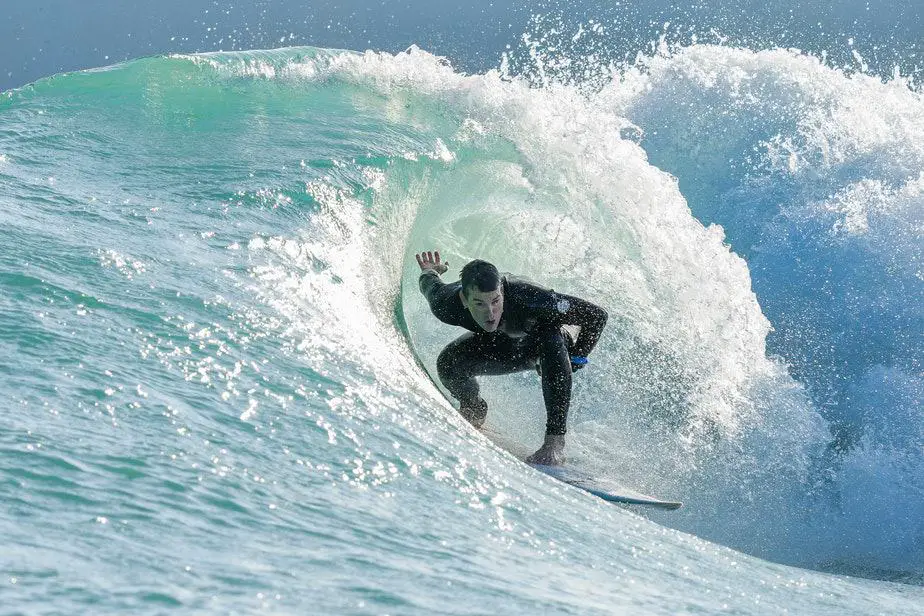
Sometimes, wetsuits are a little too good at their job of keeping you warm. When you are surfing in hot and humid weather, which is quite common in the tropics, you can find yourself dealing with 86°F (30°C) waters and surface temperatures even higher than that.
Under such temperatures, overheating can become a major risk for surfers – clean shaven or not. If you happen to be as hairy as bigfoot, then your body hair may pose a major risk for you. After all, the purpose of body hair is to keep us warm, and too much of it can make everything you do uncomfortable.
If you feel that you are getting punished by the extreme heat, then consider shaving your body hair to regulate your temperature better.
Don and doff your wetsuit more easily
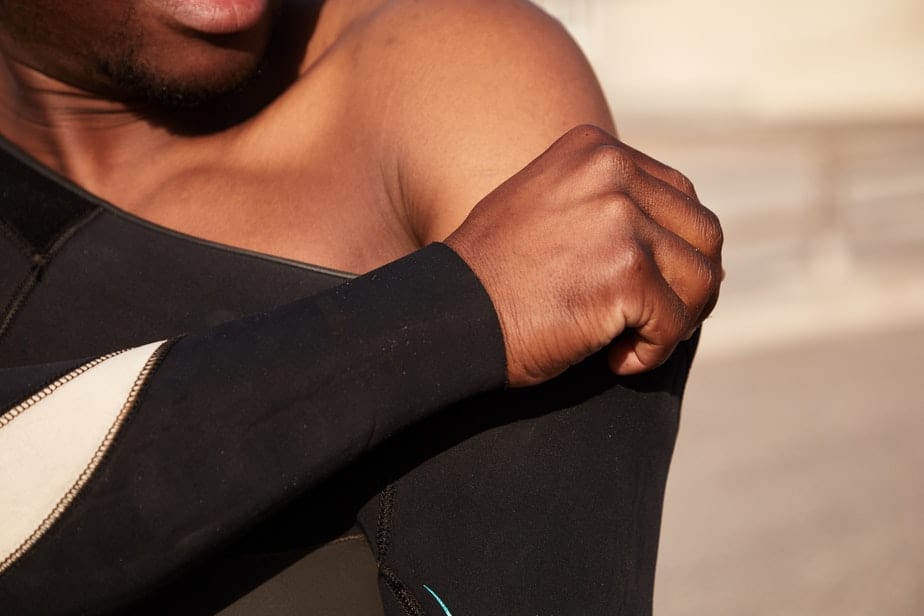
Surfing without an exposure suit is not an option because of how cold the wind chill is, plus it can protect your skin from rashes, UV rays, and other superficial injuries. The benefits are plentiful and impactful, so wetsuits are not something surfers can avoid.
That said, even if wetsuits are essential, it doesn’t mean you enjoy putting it on or taking it off. Anyone who has ever struggled to put on and take off their wetsuit would know that it can truly be a pain.
If you’re hairy, the hair can increase friction and potentially get ripped off or painfully tugged while donning and doffing your wetsuit.
One method surfers use to deal with this is to rub talcum powder on their legs to make donning the wetsuit smoother, however this does nothing for the removal process.
By shaving off your leg hair, you can fit the lower half of your body much easier which makes donning the rest of the wetsuit much easier.
That said, some surfers have had no issues donning their wetsuit despite having hairy legs, so your mileage may vary.
Fewer wetsuit/surf rashes
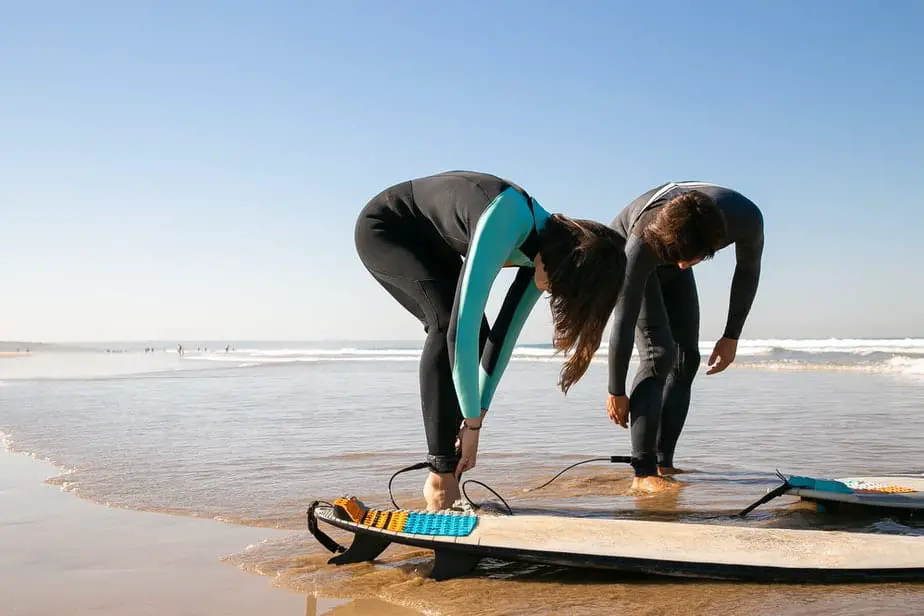
Rashes of any kind are uncomfortable to say the least. It is caused by friction between your wetsuit/surfboard and skin, and being hairy can increase the friction and therefore your chances of getting a rash.
When you have a wetsuit rash, you will be unable to wear a wetsuit until it heals because of how painful it feels. And without a wetsuit on, you have little protection against the cold which means you cannot surf in any other condition except in warm waters.
It’s no wonder that many surfers want to prevent this situation, so they preemptively shave off their body hair to have fewer wetsuit rashes. That said, it’s still no guarantee that you will be safe from wetsuit or surf rashes, but at least you’ll feel like the water is gliding off your skin.
What are the downsides of shaving body hair and surfing?
Although there seem to be some clear, proven advantages for athletes (surfers included) to shave off their body hair, there are also some disadvantages to doing so.
You might feel cold

Shaving off your body hair can make you feel cooler, which is great for hot summer days, but what if you start to feel too cool? On colder days, the lack of hair on your body can cause you to end your surfing session prematurely because you are shivering. Even if you decide to tough it out, the cold will decrease your performance.
Since body hair plays such an important role in regulating our body temperature, you do not necessarily have to shave off all of it, just the areas that are negatively affecting you. This obviously depends on each individual; some people are warmer than others and have no need to shave their body hair. Others might strategically shave only their armpit and leg hair but keep the rest.
That said, if you’re feeling too cold, it might just be that your wetsuit is too thin and that you should get a thicker one for the temperature you’re surfing at.
Less UV protection

If you’re only wearing a shorty wetsuit, then significant portions of your arms and legs will be exposed to the sun. Hopefully you’re applying reef-safe sunscreen to these areas, because if you’re clean shaven, then you are vulnerable to the sun’s UV rays.
Surfers spend many hours outdoors in direct sunlight, so unless they are diligently applying and reapplying sunscreen when it wears off (or wearing a full wetsuit for the most coverage), then clean-shaven surfers will get sunburned and increase their chances of developing skin cancer.
Increased risk of infection
It can be hard to tell, but shaving doesn’t only remove one’s hair; it also slices off a thin layer of skin as well. You might also nick yourself and create a wound, but even microscopic cuts can appear despite a successful shave. That’s why when you apply aftershave, you will feel a burning sensation.
What does any of this have to do with surfing? Well, the waters are full of nasty bacteria (due to pollution, people peeing and pooping in it, etc.) that, when exposed to fresh wounds, can drastically increase the chances of infection.
For this reason, if you have any open wounds such as from a cut, getting a tattoo, or even from shaving, it’s best you let it heal before exposing it to bacteria-ridden waters.
Dry skin
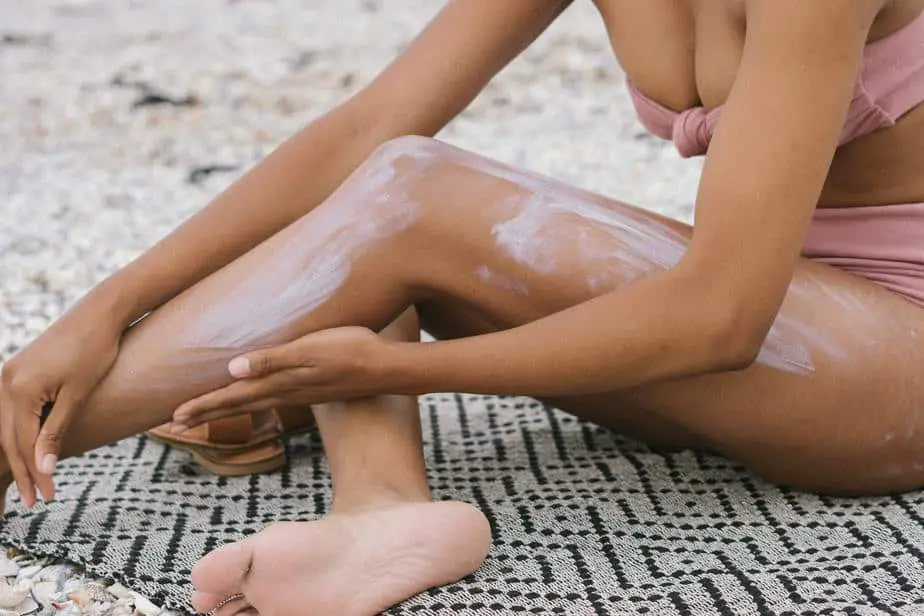
Lastly, shaving your body hair can result in dry skin. As we mentioned above, shaving removes a thin layer of skin in addition to the body hair. This is not what causes the dry skin, but rather the shaving cream or soap that we use afterwards.
Aftershave and other products like it removes oils from our skin, which is our body’s natural way of keeping the skin from drying out. If you do not apply moisturizer to counteract this, then you will quickly get dry, flaky skin.
The saltwater does our skin no favors either. You ever wonder why drinking salt water makes you thirstier? That’s because salt draws moisture from its environment, and in that case, it would be you. The risk of dry skin, and the risk of infection due to the presence of bacteria, is why you should rinse yourself with freshwater after spending time in the ocean.
Should I shave off my body hair before surfing?
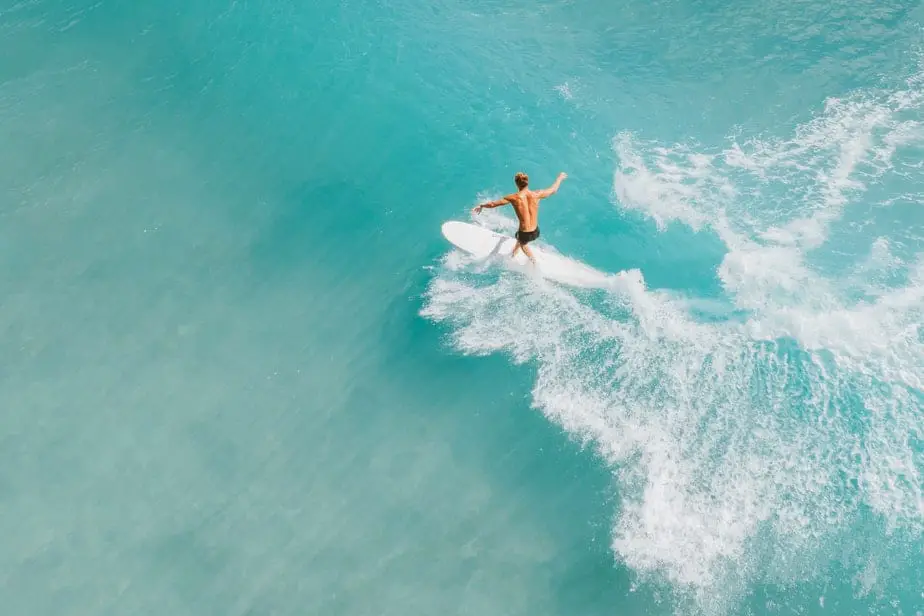
Now that you are aware of the potential risks involved with surfing immediately after shaving, the recommended option if you want to remove your body hair and surf is to wait at least 24 hours after shaving before surfing. In this small amount of time, the micro cuts caused by shaving will have time to heal which reduces your risk of infection.
As for whether it’s worth it overall to shave or not to shave, that will depend entirely on you. If you are a casual surfer, unless your body hair is causing you discomfort due to the increased insulation or by getting tugged on by the wetsuit, there’s not much reason to shave. You might notice a slight performance increase due to reduced drag, if it is even noticeable, but is it worth losing that glorious chest and leg hair for it?
We can completely understand shaving off all one’s body hair for a competition. In that setting, any advantage, even if it’s mostly psychological, is definitely worth taking. If you are a casual surfer, perhaps you, too, enjoy the smooth feeling of being hairless and gliding through the water. In that case, great, by all means shave off your body hair for this sensation.
However, for surfers who are not competing in any events, they may prefer to keep the aesthetic of having chest and leg hair because it’s simply not worth it to them to make this sacrifice in the name of surfing. After weighing the pros and cons of shaving, ultimately the final decision is yours.
Parting words
Many surfers shave their chest hair, leg hair, and so on. Conversely, many surfers don’t and have no issues surfing.
While there is an improvement in performance when one shaves their body hair, it may not be significant enough to warrant losing all of your body hair for if you’re only a casual surfer.
This is a problem that primarily affects men and less so women due to social expectations. Men who don’t have leg or chest hair are often seen as less “masculine.” Similarly, women who don’t shave are seen as unattractive, and therefore they shave to look more “feminine.” This may end up being an advantage for women for surfing and a disadvantage for men.
Some people laugh that this is even a debate. Why not try shaving off your hair, seeing if you like it (or notice an improvement in performance), and making an informed decision yourself? If you end up hating it, you can always wait a few weeks for your hair to regrow. No long-term harm done.

